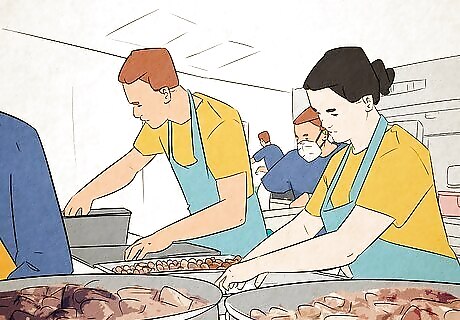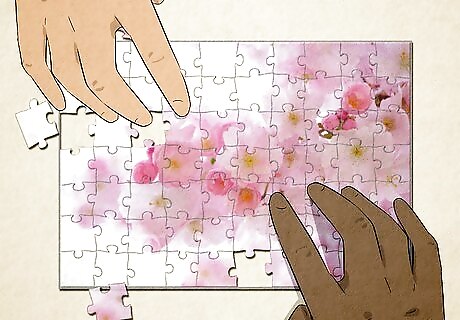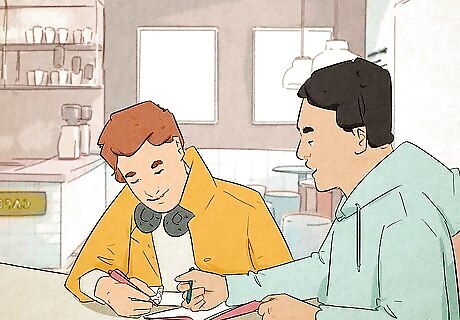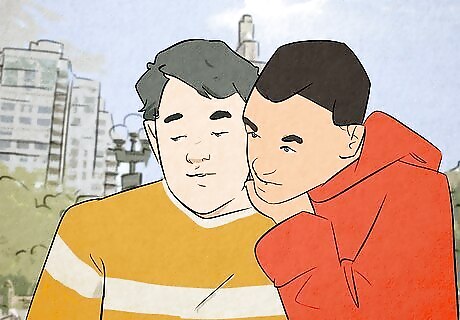
views
- ENFJs are highly compatible with ENFPs and INFJs because they need partners who value emotional connection and appreciate generosity.
- ISFJs and INTJs are suitable matches for ENFJs because they complement and challenge their extroverted nature.
- ENFJs fall in love quickly and wear their hearts on their sleeves. Although, they can be insecure if their crushes or partners don’t reciprocate their feelings.
Best Matches

ENFP ENFJ and ENFP are empathetic and sociable souls, making them a perfect pairing. These personalities both crave companionship and thrive in social situations. Their compassionate natures help them open up to one another, allowing them to be supportive and understanding partners. To bond: Ask each other personal questions. You both love getting to know people at a deeper level, so don’t be afraid to find out what makes them tick! Be careful with: Moving too fast. ENFPs are slightly more reserved compared to ENFJs. While they fall in love fast, they may be insecure about their partner’s motives, so be open and honest about your intentions.

ENFJ Who better to support an ENFJ’s kind heart than another ENFJ? Two ENFJs together are certainly a power couple. They’re able to support each other's ambitions equally while communicating and being empathetic of one another’s needs—it’s simply a match made in heaven! To bond: Volunteer together. You’re both empathetic and social, so helping others side-by-side is the perfect date idea. Be careful with: Self-sacrificing behavior. You may push aside your own needs to help each other or others. Remind your partner to take care of themself, and in turn, they’ll remind you to practice self-care.

INFJ ENFJ and INFJ go hand in hand as “the Teacher” and “the Advocate.” These personality types complement each other’s work ethic, empathy, and supportive nature. Like ENFJ, INFJ wants to help others reach their fullest potential, making this pairing a dynamic duo. They can easily read one another’s emotions and are willing to go the extra mile to support each other’s ambitions. To bond: Read a book together. Start your own book club to learn something new and start insightful conversations. Be careful with: Social outings. INFJs are introverts, while ENFJs are extroverted. This may cause conflict on where to spend date night, so alternate between going out and staying in.

ESFJ ENFJ and ESFJ both enjoy helping others. These two are caregivers at heart, which can help them form a healthy and lasting relationship or friendship. Both extroverted individuals, an ENFJ and ESFJ thrive in social settings and will do whatever they can to make the other smile. To bond: Enroll in a class together. Sign up for a painting, dancing, or fitness class to learn something new in a larger group. Be careful with: Pleasing one another. You both tend to feel inferior if you don’t get gratification. Express genuine gratitude for each other daily to avoid this.
Solid Matches

ISFJ An ENFJ and ISFJ are a yin-yang match. These personality types are loyal, empathetic, and compassionate, but their differences in social situations set them apart—ENFJs are extroverted, while ISFJs are introverted. While they both strive to make the world a better place, an ISFJ’s need for structure and routine can hinder an ENFJ’s spontaneity. To bond: Share hobbies. Who knows? You may just learn something new from one another. Be careful with: Pushing each other too hard. Your relationship helps you branch out of your comfort zone, but try not to push each other into uncomfortable territory.

INTP ENFJ and INTP are a complementary team. These personality types look like polar opposites on paper, but this is what makes them a fine pairing. As friends and partners, ENFJ and INTP bring out the best in each other. ENFJs like to be around people, whereas INTPs like spending time alone; ENFJs focus on emotions, while INTPs stick to the logistics. To bond: Play a puzzle game. This way, you can both be entertained and logically challenged. Be careful with: Communication. INTPs struggle to express their emotions, so do your best to clearly state how you’re feeling, especially in a disagreement.

ESTJ ENFJ and ESTJ have strong belief systems. Both extroverted, strong-willed, and reliable, these personality types seem like a perfect pairing, though they tend to butt heads now and then. ESTJs are a bit judgemental and stubborn, which contradicts an ENFJ’s empathy. However, an ESTJ’s practical reasoning can ground an ENFJ’s emotions to help them make rational decisions. To bond: Share childhood memories. ENFJs love getting to know people, and ESTJs have impressive memories, so use that to your advantage! Be careful with: Opinions. You’re both assertive, and this could cause disagreements. Listen actively to each other, and you may be surprised by what you learn.

ESFP ENFJ and ESFP bond over their love of others. These personality types thrive on attention. While an ENFJ actively helps people, ESFPs seek to entertain and make people happy. This makes for an uplifting duo that’s sure to make anyone’s frown turn upside down. To bond: Go to a play or concert. The livelier the outing, the more at home you’ll both feel. Be careful with: Priorities. ESFPs tend to prioritize their own emotions, while ENFJs prioritize others. Take turns expressing your wants and needs to make sure you’re both being heard.
Possible Matches

INTJ ENFJ and INTJ have conflicting personality traits. While ENFJs are spontaneous and extroverted, INTJs are introverted and reserved. However, as friends, ENFJ and INTJ can help each other thrive. INTJs are big and determined dreamers. This can work in an ENFJ’s favor as they’ll do whatever they can to support an INTJ’s endeavors. To bond: Start a project together. Use your creativity and love of accomplishment to help each other succeed. Be careful with: Conflicting values. You may value different things than your friend or partner, and that’s okay! Think of these as an opportunity to learn something new rather than a reason to argue.

INFP It may be difficult for an ENFJ to get to know an INFP. While these personality types are both loyal, compassionate, and open-minded, an INFP’s introversion may bore an ENFJ. ENFJs love lively social gatherings, whereas INFPs prefer hanging out with just a few close friends. To bond: Play 20 questions. Want to be friends with an INFP? Break the ice with this classic game to help them open up. Be careful with: Social differences. Don’t force an INFP to go out on the town, as this may cause them to close up and revert back into their shell. Instead, let them go at their own pace.

ENTP While ENFJ and ENTP are both friendly and outgoing, their strong wills can put them at odds. These personality types seem like a perfect match on the surface, but an ENTP’s stubbornness and quick wit may rub an ENFJ the wrong way. Unlike ENFJs, ENTPs are a bit combative, which clashes with an ENFJ’s understanding nature. To bond: Do something challenging together, like rock climbing or running a marathon. Bond over your persevering and supportive natures by helping each other succeed. Be careful with: Difficult conversations. Although non-judgmental, ENTPs can be stubborn and may not be open to criticism, while ENFJs often internalize other people’s emotions.

ENTJ ENFJ and ENTJ may battle for leadership. Both of these personality types are headstrong, outgoing, and sociable, making them excellent leaders. However, in a friend group, they may challenge the other for leadership. ENFJs tend to lead and follow their emotions when making decisions, while ENTJs are more logical. To bond: Make a list of goals together. You’re both goal-oriented, so focus on what you can do to help each other succeed. Be careful with: Problem-solving. You both bring a different aspect to the table (emotions and logic), so listen actively to one another—you may learn something new!
Challenging Matches

ISTP ENFJ and ISTP are polar opposites. These personality types couldn’t be more different—ENFJs are extroverted leaders who follow their emotions, whereas ISTPs are introverted risk-takers who follow logic. These differences in nature can lead to troubling friendships and relationships, as ENFJs and ISTPs often have trouble seeing eye to eye. How to make it work: Listen actively to one another and use “I” statements to express what you’re thinking. You both express emotions differently, so try being matter-of-fact in your reasoning.

ISTJ An ISTJ’s rigid routine goes against an ENFJ’s outgoing nature. This pairing is anything but perfect and often leads to conflict. ISTJs are naturally reserved, serious, and matter-of-fact, whereas ENFJs are friendly, optimistic, and emotional. Because of this, these types tend to clash romantically and platonically because they view life differently. How to make it work: Try to see the world through your partner’s eyes. Showing empathy can help you recognize and understand why they do what they do.

ISFP An ISFP’s easy-going nature may get on an ENFJ’s nerves. While these personality types are both sensitive, their social difference often irritates each other. ISFPs are creative individuals with a strong need for personal space, whereas ENFJs are leaders who thrive in social settings. ENFJ and ISFP are rarely seen in the same space because of this, making them highly unlikely to mingle and form a relationship. How to make it work: Take a deep breath when you feel uneasy, rather than starting an argument. Close your eyes and focus on your breathing—what can you hear, smell, and taste? Grounding or calming yourself can help you see both sides of a situation.

ESTP The judgemental attitude of an ESTP can throw an ENFJ off. Although both of these personality types are outgoing and personable, ENFJ often butt heads with ESTPs because of how they interact with others. ENFJs connect with others emotionally, while ESTPs avoid emotional discussions whenever possible and use logistical leadership tactics instead. How to make it work: Cautiously approach emotional conflicts or discussions. Warn your partner about the nature of the conversation before you have it. This way, you can both prepare.
ENFJs in Love

ENFJs fall in love fast. When an ENFJ is in love, everyone knows it. This personality type can quickly fall head over heels. They wear their heart on their sleeve and aren’t afraid to express their emotions. An ENFJ isn’t afraid to make the first move, but they have high standards and expectations that may limit their dating pool.

ENFJs are supportive of their partners. Above all else, an ENFJ will go to the ends of the earth to make sure their partner is happy and loved. They’re always willing to lend a helping hand, and their knack for reading emotions lets them understand their partner’s wants and needs. An ENFJ will go out of their way to create opportunities to match their loved one’s goals and desires. ENFJs may subconsciously take on their partner’s goals, especially if they’ve been in a relationship for a long time. They care so deeply for their partner’s success that they’ll internalize their goals.

ENFJs seek harmony in relationships. An ENFJ wants everyone to be happy, even at the expense of their own needs. They’re sensitive to criticism and do their best to avoid conflict; however, their insightful and emotionally in-tune nature helps them resolve issues quickly, even when they try to avoid them. Along with this, ENFJs can be overprotective, especially when it comes to a loved one’s feelings. They’ll often put their own emotions on the line if it means protecting someone they care about. If you’re an ENFJ, don’t take a failed relationship personally. Not every relationship works out, and that’s not your fault! Think of it as a chance to learn and grow rather than a missed opportunity.

ENFJs can come across as overbearing. An ENFJ’s protective, affectionate, and supportive nature may be overwhelming for some. These personality types can get overly involved in their loved one’s life. They don’t mean to hover! They simply want to do everything they can to ensure the people they love succeed. If you’re an ENFJ, take a step back from your friend or partner’s life every now and then. Helping them out is incredible, but remember that sometimes a cheerleader’s best work is done from the sidelines. If you’re in a relationship with an ENFJ, communicate your boundaries. Be honest about what you want and need in the relationship, especially when it comes to personal space and alone time—an ENFJ will do their best to honor your wishes and support your every need.
ENFJ Strengths & Weaknesses

ENFJs are affectionate, reliable, and sociable. This personality type is extremely outgoing and extroverted. They thrive on the energy of others and flourish in large and small groups. ENFJs build strong relationships quickly thanks to their loyal, caring, and empathetic nature. Basically, they’re the friend you can always count on. With these highly sociable traits and skills, ENFJs make excellent psychologists, teachers, counselors, coaches, and managers. All in all, ENFJs strive to help others and make the world a better place.

ENFJs can be self-sacrificing, indecisive, and manipulative. Sometimes, an ENFJ’s empathetic nature can get the best of them. They can easily become too involved in outside situations and tend to take on other people’s problems as their own. Because of this, they may come across as manipulative rather than helpful, despite their best intention. If you’re an ENFJ, remember to focus on your needs and wants. It’s okay to be selfish every once in a while. Remember, you can’t fill someone else’s cup if yours is empty.
ENFJs as Parents

ENFJs are active and enthusiastic parents. As with their partners, ENFJs are extremely supportive of their children. They want to take their little ones under their wing and show them the difference between right and wrong. ENFJs truly are “the teachers” of society, and this is no exception to how they raise their kids. An ENFJ often has high expectations for their children and envisions a bold and bright future for them. As a parent, they’ll do whatever they can to make sure their kid(s) succeeds. ENFJs may take a child’s misbehavior personally, believing they didn’t raise them well enough.




















Comments
0 comment